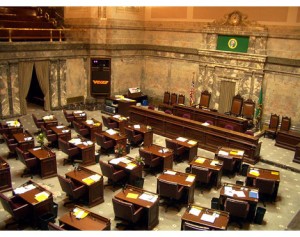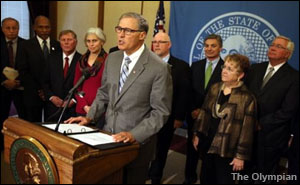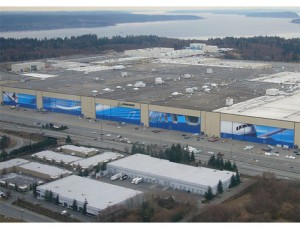STATE GOVERNMENT
Will the State Legislature act for the 777X?
 Following is the WSLC Legislative Update newsletter posted today by the Washington State Labor Council, AFL-CIO. Download and print a PDF version of the newsletter.
Following is the WSLC Legislative Update newsletter posted today by the Washington State Labor Council, AFL-CIO. Download and print a PDF version of the newsletter.
Advocates for jobs, Boeing can take action or make more excuses
OLYMPIA (Nov. 7, 2013) — The timing and schedule may have surprised some, but every state legislator knew it was coming.
 Gov. Jay Inslee made the surprise announcement on Tuesday that a special legislative session would convene — starting today — to consider a package of incentives for The Boeing Co. to locate 777X work in Washington state. For weeks, a bipartisan 777X Legislative Task Force of state lawmakers, the governor’s office, and business and labor leaders has been meeting to develop the package.
Gov. Jay Inslee made the surprise announcement on Tuesday that a special legislative session would convene — starting today — to consider a package of incentives for The Boeing Co. to locate 777X work in Washington state. For weeks, a bipartisan 777X Legislative Task Force of state lawmakers, the governor’s office, and business and labor leaders has been meeting to develop the package.
But for much, much longer than that, legislators from both parties have been debating how to maintain a thriving aerospace industry in Washington state. They knew that we were in a competition with other states that desperately want jobs and investment from Boeing and its suppliers. They knew that, for all the business-climate rhetoric and political gamesmanship, the time for speeches and dithering would eventually end. They knew the day would come that they would have to make some tough choices — and act.
It’s that time.
The Seattle Times is reporting that some state legislators are already trying to parse the language of a Letter of Understanding between Boeing and the Machinists Union to argue that it doesn’t matter what the Legislature does, the 777X work depends solely on the union’s contract vote. Not so, says the governor, the Machinists Union (see IAM’s open letter to legislators) and legislative leaders of both parties who have had direct talks with Boeing officials. They say the incentive package is needed to secure the 777X work. As always, Boeing will not comment to clarify.
In this context, anyone who uses the union vote as an excuse NOT to act on the incentive package is simply rolling the dice that legislative complacency doesn’t matter to Boeing. There should be no question that it does matter.
 Surrounded by key lawmakers, business and labor leaders, and yes, Boeing officials at Tuesday’s press conference, Gov. Inslee said the package up for consideration includes:
Surrounded by key lawmakers, business and labor leaders, and yes, Boeing officials at Tuesday’s press conference, Gov. Inslee said the package up for consideration includes:
— A bipartisan transportation revenue package.
— Extension of all commercial airplane tax incentives until 2040, and expansion of the current sales and use tax exemption on construction of buildings to manufacture “superefficient airplanes” to include all commercial airplanes and suppliers of wings and fuselages.
— Education and workforce development investments to boost enrollments in aerospace fields at community and technical colleges, train workers for manufacturing of composite wings and complete the Central Sound Aerospace Training Facility in Renton.
— Streamlined permitting actions that will speed up development and expansion of facilities at large manufacturing sites around the state.
— Developing balanced, practical solutions that achieve water quality goals (also referred to as fish consumption).
WHY TRANSPORTATION IS SO IMPORTANT
The first two items — transportation and tax incentives — are clearly the centerpiece of the package. It’s easy to understand why Boeing would want to retain the tax incentives created in 2003 to secure 787 work in Washington. Those incentives are set to expire in 2024 unless the Legislature acts to extend them. The governor proposes to do so for 16 years.
What might be harder to understand is why Boeing would care so much about a statewide transportation revenue package. For those who were listening at the Senate’s transportation “listening session” on Oct. 14 in Seattle, here’s the answer.
 “We are one of the top aerospace suppliers. We will ship 1¼ million parts,” said John Theisen, president of Orion Industries in Federal Way, who was there to implore the 11 lawmakers onstage to deal with traffic congestion. “Delivery schedules that once could be accomplished in four days now take five. The Everett-to-Auburn route that used to take a half-day now takes a full day.”
“We are one of the top aerospace suppliers. We will ship 1¼ million parts,” said John Theisen, president of Orion Industries in Federal Way, who was there to implore the 11 lawmakers onstage to deal with traffic congestion. “Delivery schedules that once could be accomplished in four days now take five. The Everett-to-Auburn route that used to take a half-day now takes a full day.”
That kind of freight and employee mobility problem substantially raises the cost of doing business in Washington, not just for Boeing and its suppliers, but for all businesses. That’s been the consistent message from Boeing and the rest of Washington’s business community throughout the 2013 legislative session: the Legislature must pass — not punt to voters, but pass — a transportation revenue package that begins paying for the upkeep and construction of roads and bridges.
The House — thanks to leadership from Rep. Judy Clibborn (D-Mercer Island), House Speaker Frank Chopp (D-Seattle) and Gov. Inslee — took the tough vote and approved such a package earlier this year. But the Republican-controlled Senate never considered it, largely because it included funding for the controversial Columbia River Crossing between Vancouver and Portland. After months of hearings and debate, the Senate never took a vote or proposed an alternative plan either.
The governor has taken the CRC off the table and traveled the state to plead for action on transportation. The Senate has finished its listening sessions and their leaders have been meeting for weeks to try to agree internally on a plan. So, for more than 10 months, the Senate has been working on a transportation package that addresses the concerns of Boeing and the rest of the business community — not to mention the general public — and still has nothing to show for it.
Surely, now that the Boeing 777X work is specifically at stake, the Senate would be moved to act. Right?
Wrong.
MORE DITHERING IS NOT AN OPTION
Within hours of the governor’s call for a special session, the Senate Republican Majority Coalition Caucus (MCC) issued a press release that said that they were fine with four out of five of the governor’s special-session agenda items: all of them except transportation funding.
“Boeing leaders and union officials are fine with giving lawmakers more time to work on a transportation-investment package,” the MCC wrote, “rather than expecting them to hurry something so complex through during the special session.”
Except that organized labor isn’t “fine” with that. And it’s unlikely that Boeing is either. Transportation funding is not so “complex” that it can’t be accomplished during this special session. A template is already in place — the House-approved legislation minus the Columbia River Crossing. At Tuesday’s press conference, House Speaker Frank Chopp said he believed that lawmakers’ work could be done within a week, adding, “We are working in good faith to come up with a revised package.”
The Senate has equivocated for more than 10 months on transportation funding to no avail. There is no reason to think that more time will cure their obvious aversion to taking a tough vote on raising gas taxes to fund transportation improvements. In fact, waiting until we get closer to next year’s election will further weaken their political resolve to act.
Do you think Democrats are eager to come to Olympia to extend a multi-billion corporate tax break? Of course not. But the governor and Democratic leaders understand that now is the time for action, not excuses or wishful thinking.
It is not a question of time, it is a question of resolve.
BEWARE OF IDEOLOGICAL POISON PILLS
The danger of a special session is that the governor can set an agenda, but legislators don’t need to follow it. Unrelated legislation can be introduced to try to ride the coattails of the Boeing incentive package. Amendments can be added to the governor’s proposals that introduce controversial ideological policies that wouldn’t pass on their own merits.
During this summer’s transportation listening sessions, press reports noted that the Senate MCC was guiding the conversation toward their recurring theme of “reform before revenue.” There was talk of long-sought ideological policies like changing prevailing wage laws in such a way that road construction workers earn less or relaxing apprenticeship utilization standards. Even the state’s conservative-leaning newspaper editorial boards saw this was a road to nowhere.
“No (transportation funding) package can be held hostage to a partisan wish list and deal killers such as ‘an open dialogue on prevailing wage’,” read an Aug. 13 editorial in The (Everett) Herald. “Most assume these throwaways were inserted to assuage red-meat caucus members. But keep-em-happy politics can’t be allowed to sidetrack the package goal.”
That is doubly true now that the 777X deal hinges on action. If conservative lawmakers attempt to insert these types of policy changes into the package, that’s a sure sign that they don’t want to take the tough vote on gas taxes or they aren’t taking seriously the threat of losing Boeing work.
In an Oct. 17 editorial entitled “Transportation package must be passed without gridlock,” The (Spokane) Spokesman-Review wrote: “As the U.S. House Republicans demonstrated during the government shutdown, it isn’t realistic to extract major concessions on controversial issues from a minority position. Until Republicans gain control of the House or governorship, it’s counterproductive to hold up transportation projects until they get their way.”





